Understanding Agriculture in Palestine and How Aid Can Help
Posted in: Programs
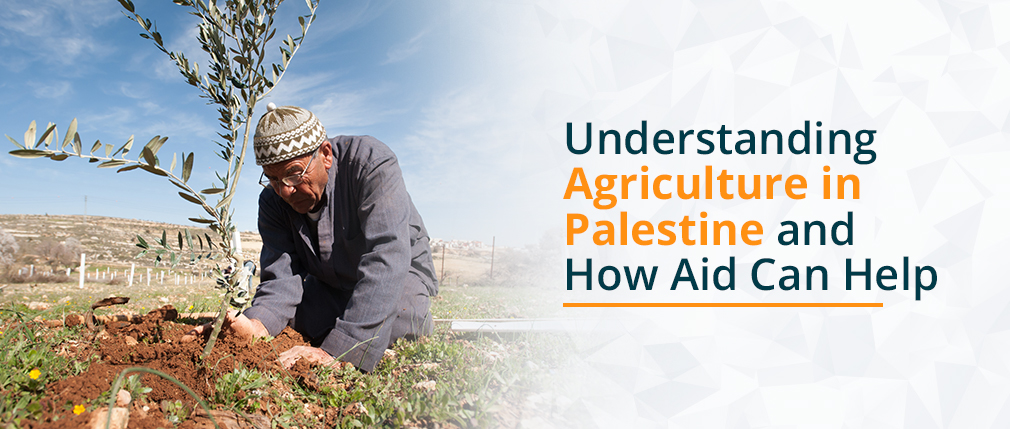

Development aid provides critical assistance for countries around the world. It helps create long-term plans to alleviate health crises, promote economic growth, ensure the availability of essential resources and help communities progress and flourish.
One of the ways aid can help is through establishing agricultural programs. Farming in Palestine is the largest sector of the economy. According to the Centre for Economic Policy Research (CEPR), agriculture employs 13.4 percent of the population formally, though informally it employs about 90 percent of those who work. In Gaza, agriculture offers life-saving job opportunities in a region rife with unemployment. And in the West Bank, where farming has been a way of life since ancient times, agriculture makes up an integral part of cultural identity. It also offers opportunities for stable employment and sustainability.
Yet the contributions of agriculture to the Palestinian economy have diminished over the years. Before 1967, the agricultural sector was responsible for more than 50 percent of Palestine’s gross domestic product, according to a report from the United Nations Conference on Trade and Development (UNCATD). In the 1980s, that percentage dropped to about 30 percent, and in recent years it has plummeted to 5.6 percent. Agricultural yields in Palestine also remain low in comparison to those in other regions. Despite nearly identical soil and climatic conditions, yields in Palestine are about half of those seen in Jordan and only 43 percent of those produced in Israel.
For these reasons, agricultural improvements are critical to creating more livable conditions in Palestine in the years to come. In this article, we’ll lay out some recent developments in Palestine agriculture and explain how agricultural aid programs offer vital opportunities for further growth.
Recent Agricultural Aid Programs in Palestine
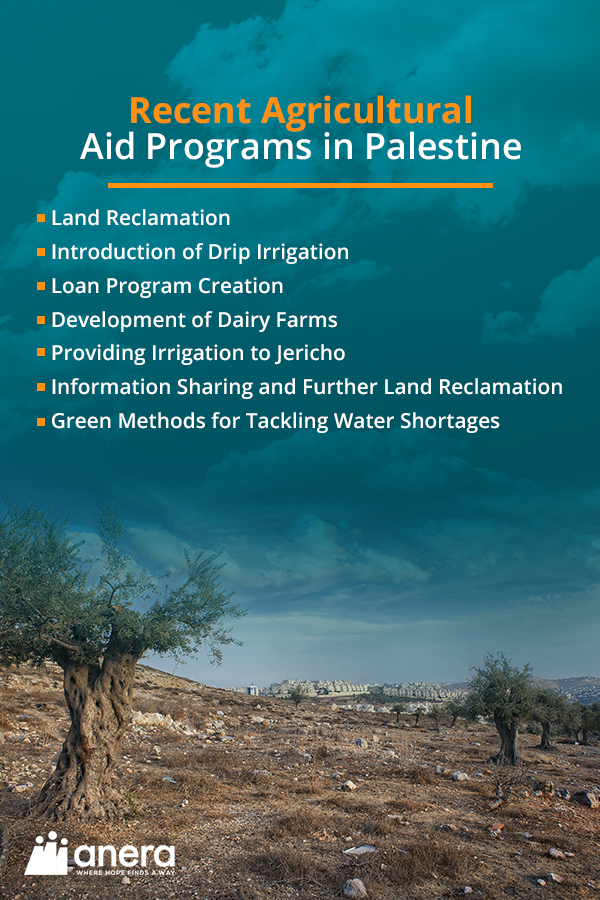

Anera has a long history of creating lasting impact through agricultural programs in Palestine.
1. Land Reclamation
From 1985 through 1994, Anera helped Palestinian farmers reclaim hundreds of acres of land in the West Bank, using bulldozers and tractors shipped in from abroad. Reclaiming these acres of farmland helped improve the quality of life for many Palestinian farmers. Other nonprofits, seeing the success of our programs, jumped in to assist Palestinian farmers with land reclamation as well.
2. Introduction of Drip Irrigation
During the same period, Anera also experimented with drip irrigation. Because Israel controlled Palestine’s water supply, water in Gaza and the West Bank was often in incredibly short supply. Anera created a trial plot where it could use drip irrigation to help provide much-needed moisture to a small patch of crops. Most Palestinian farmers were unfamiliar with drip irrigation and did not understand how it could add value to their operations. But Anera demonstrated the advantages of drip irrigation and convinced many farmers to adopt the practice to keep their farms healthy, thriving and productive.
3. Loan Program Creation
The land reclamation program was successful, but Anera wanted to boost the financial security of even more Palestinian farmers. In the early 1990s, we developed a loan program as well. This loan program still exists today, benefiting thousands of Palestinian farmers.
Our new loan program partnered with the Bank of Palestine to reach out to small farmers through a rotating loan system. At the time, Palestine had no Ministry of Agriculture to which farmers could turn for aid. But Anera introduced its microfinance program in five different Palestinian districts to fill that role.
Under this program, Anera guaranteed the loans — if a farmer failed to pay back loans, the bank would receive money from capital Anera had set aside in a designated account. This guarantee program diminished the risk to banks and helped stimulate agriculture by encouraging more lending to small farmers.
4. Development of Dairy Farms
The next step in helping revive Palestinian agriculture was to encourage the development of Palestinian dairies. Because of a boycott of imports, Palestine had experienced a substantial shortage of dairy products. With Anera’s help, Palestinian farmers formed dairy cooperatives to improve their farming methods and produce more dairy products. Anera also helped develop mobile veterinary clinics, buy pasteurizing equipment and train farmers in the equipment’s use.
The dairies soon became self-sufficient, each producing over a million gallons of milk a day to help provide sustenance for their local communities.
5. Providing Irrigation to Jericho
During the Second Intifada, Jericho, which has one of the most arid climates in the region, suffered terribly from drought. A growing population, the harsh climate and lack of control over its water supply made Jericho’s water shortage critical. Anera helped with the installation of an irrigation system to help alleviate Jericho’s water burden.
For its water supply, Jericho relied heavily on a spring called Ein Al-Sultan. But crumbling supply infrastructure meant the spring could not supply the necessary amounts of water. Anera raised funding from the United Nations — and from Jericho’s government as well — to install a state-of-the-art irrigation system that could reliably supply water to 900 Jericho family farms.
6. Information Sharing and Further Land Reclamation
Military checkpoints, Israeli settlements and miles of a barrier wall all combine to fracture Palestinian communities. Anera stepped in to help Palestinians share knowledge and stay connected. Land reclamation was also one of the benefits of this project. Farmers who wished to reclaim land in areas of limited resources could connect with other farmers who had reclaimed land. They could listen to success stories and receive advice about how to approach the reclamation process and flourish on their acquired land. Short films, a full documentary, farmers’ conferences, and Facebook and Youtube pages were among the resources available through the knowledge-sharing program.
7. Green Methods for Tackling Water Shortages
Anera’s latest programs use recycled water from wastewater treatment plants to irrigate parks and fields of animal fodder and fruit trees. Our treated wastewater network in Jenin irrigates 700 acres of parched West Bank farmland, saving 15.8M gallons of water from being thrown away annually. The network we are installing in Ramallah will annually facilitate the reuse of 63.4M gallons of wastewater to irrigate gardens and parks, as well as to fight fires.
In Gaza, with its immense, crowded population, transport limitations, high unemployment rates, and crippling levels of poverty, water scarcity is an overwhelming issue as well. Here, Anera has spearheaded projects focused on providing families with irrigation systems and greenhouses so they can grow their own food. We also have begun piloting hydroponic gardening on the rooftops of community centers.
Why Aid Is Necessary for Palestine’s Agricultural Sector
Aid programs help provide numerous distinct, observable advantages in the agricultural sector of Palestine’s economy.
1. Resolving Farm-to-Market Challenges
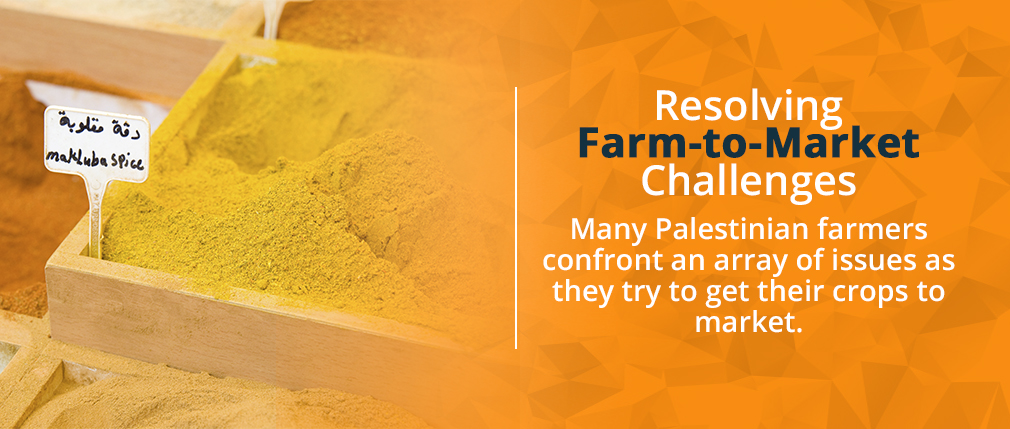

Currently, many Palestinian farmers confront an array of issues as they try to get their crops to market. Transportation issues and road restrictions make what should be a straightforward process a convoluted and hazardous one.
In Gaza, bombings have damaged 30 percent of existing roads. And Palestinian farmers — especially those in Gaza, but many in the West Bank as well — face stringent restrictions on exporting crops outside their borders.
Fortunately, aid programs can help. Over the past decade, Anera has assisted in the construction of more than 60 miles of roadways in Palestine to help farmers get their products from their farms to markets. We have also helped construct several wholesale markets so farmers can sell their goods within Palestinian borders instead of feeling stifled by export restrictions. We choose accessible locations and provide features such as loading docks and parking spaces to encourage robust participation in the markets.
2. Increasing Self-Sufficiency
For many Palestinian families, growing their own food helps them improve their independence and self-sufficiency.
Much of the food sold in Palestine comes from Israel. But many Palestinians do not want to depend on Israel for subsistence.
For centuries, agriculture was a dependable means through which Palestinians made a living. But this agricultural identity has faded in recent years. Many Palestinians wish to return to their agrarian roots and feel more connected to the food they consume.
Some Palestinians have become involved with community-supported agriculture (CSA) models, in which consumers invest in local farms by subscribing for produce at the beginning of each season and then receiving a continual supply of quality, locally grown produce. CSA models are environmentally friendly and sustainable, they support local farms, and they make communities more self-sufficient by allowing them to invest in the production of the food they consume. Over a quarter of the Palestinian population experiences food insecurity, but CSA models help provide greater food security, as well as creating agricultural job opportunities.
Organic farming also offers increased self-sufficiency to Palestinian farmers. Organic olive oil, which Palestinian farmers can ship abroad, currently brings in about $5 million a year on the international market. However, many residents who live in poverty cannot afford organic products, so they buy whatever their budgets allow, often from Israeli markets.
Aid can help increase Palestinian farmers’ self-sufficiency. Investing in Palestinian farms helps ensure the farms’ longevity and allows them to produce sustainable, quality food for their local communities. Procuring supplies and learning best practices can be difficult in heavily restricted Palestine, but aid groups can provide local farms with the irrigation, equipment and training they need to flourish.
3. Decreasing Unemployment Rates Through Agricultural Expansion
Thriving agricultural operations can offer employment to members of their local communities as well.
In Palestine, unemployment is tremendously high, particularly among youth. In the West Bank, about 24 percent of young people are unemployed, and in Gaza, that number is much higher — about 70 percent — according to CEPR. In Gaza, the current overall unemployment rate is almost 47 percent — one of the highest in the world.
In Gaza, even though agriculture makes up only 7 to 8 percent of the economy, 85 percent of the exports are agricultural products. And agriculture, which is incredibly labor-intensive, employs a proportionately huge number of workers — about 30,000 official workers, as well as many more unofficial workers like seasonal or day laborers. UNCTAD reports that, as of 2012, 94 percent of Palestinians working in agriculture were unpaid family members of farmers.
Many people hope an increase in agricultural opportunities can help lower that rate. Expanded agricultural opportunities would allow more of those workers to earn a wage.
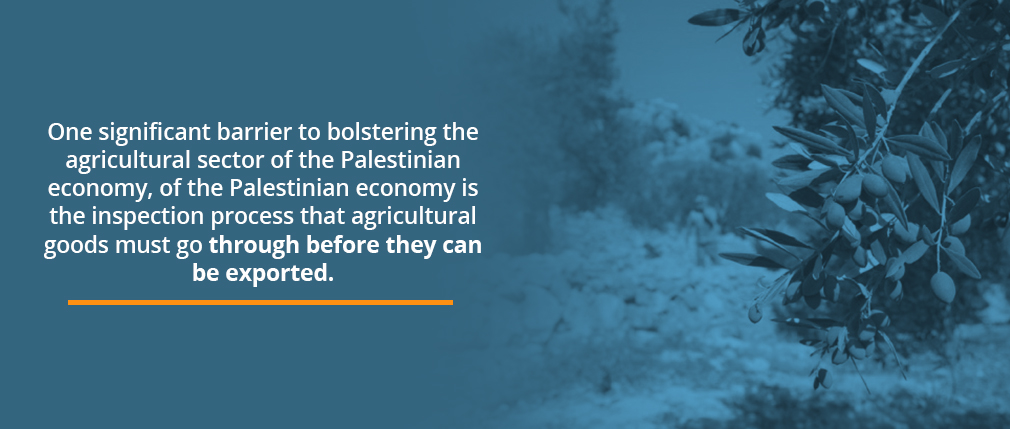

One significant barrier to bolstering the agricultural sector of the Palestinian economy, though, is the inspection process that agricultural goods must go through before they can be exported. Because of security concerns, products meant for export must undergo a lengthy inspection, often spending several hours uncovered in the hot Middle Eastern sun. Afterward, not all the products are fit for export, which is why Palestine does not export its dairy products. Because no cold storage facilities are available, the products would spoil before they get to international markets. Getting through these security checkpoints also requires significant fees.
Nevertheless, there is hope that aid programs can help improve the situation. Aid groups can provide technical training to farmers, teaching them how to increase their yields to enhance profitability and maximize their limited supplies of electricity. They can also help farmers procure equipment such as greenhouses, irrigation systems and raised beds to improve their yields and efficiency. And farms producing more crops will be able to employ more workers as well.
4. Improving Palestine’s Export Economy
Palestine’s economy relies on agricultural exports. But as we’ve discussed above, getting Palestinian agricultural products onto the export market is tricky. And when the supply of foods to export is limited because of the rigidity of the export system or flaws in the agricultural system, the whole economy suffers.
The 2015 UNCTAD report lists several reasons for the stagnation of the Palestinian agricultural export economy:
- Restrictions on fertilizer: Because of security concerns, it is difficult for Palestinian farmers to procure fertilizer. The unavailability of fertilizer leads to two issues — decreased crop yields and depletion of soil nutrients. Depleted soils can reduce the next year’s crop yields even further, leading to a cycle of diminishing returns, limited crops for export and weak profits. UNCTAD estimates that the productivity of Palestinian agriculture has diminished by 20 to 33 percent since Israel began restricting the import of fertilizer into Palestine.
- Stringent inspection processes: Lengthy inspections in which agricultural products are left uncovered and unrefrigerated lead to spoilage and diminished offerings for the export markets. Some products cannot be offered on the international market at all.
- Restricted movement: Checkpoints, barriers and degraded road conditions all restrict the movement of agricultural goods throughout Palestine. These restrictions make it difficult for Palestinian farmers to get their products to markets and from there ship them abroad.
- Restricted land use: Particularly in Area C, which makes up 61 percent of the West Bank and is under complete Israeli control, barriers and settlement encroachment have restricted the amount of land available for agriculture. UNCTAD estimates that 63 percent of land in the West Bank, including the most fertile areas and the best land for grazing, is unavailable for agricultural use.
- Lack of control over electricity and water supplies: Israel supplies much of Palestine’s water and electricity. Consequently, supplies are limited. Some areas of Palestine — particularly in Gaza — receive electricity on an irregular schedule. Limited electricity and water supplies both hamper Palestinian farmers’ ability to produce agricultural goods for export.
- Restricted drilling: Israel also restricts drilling in Palestine. For this reason, Palestinian farmers cannot construct wells to help supply sufficient water to their farms and increase their productivity.
- Low-efficiency crops: Although olives are useful for making exportable olive oil, olive crops bring in less value overall than other fruit and vegetable crops. During harvest season, olive groves are often inaccessible because of barriers, and olive groves are often targets of fire and vandalism. Yet olive trees account for 57 percent of cultivated Palestinian land, whereas other fruits and vegetable crops account for only 19 percent.
- Restricted import of seedlings and livestock: One way to improve the productivity of Palestinian farmland would be to introduce better-growing varieties of plants, along with more productive livestock. However, restrictions on seedling and livestock import make these agricultural improvements challenging to achieve.
Aid work in Palestine throughout the past decade has helped begin to revitalize Palestine’s agricultural economy. By helping Palestinian farmers procure irrigation systems and greenhouses, form cooperatives, gain veterinary care and better roads, and receive the training they need to increase their farms’ yields, Anera has offered some relief in this historied region.
But much more work remains. Further aid programs must increase access to resources, help alleviate unemployment, and find creative ways to help farmers thrive under restrictive conditions and a shortage of export opportunities.
Partner With Anera to Contribute to Agricultural Progress in Palestine
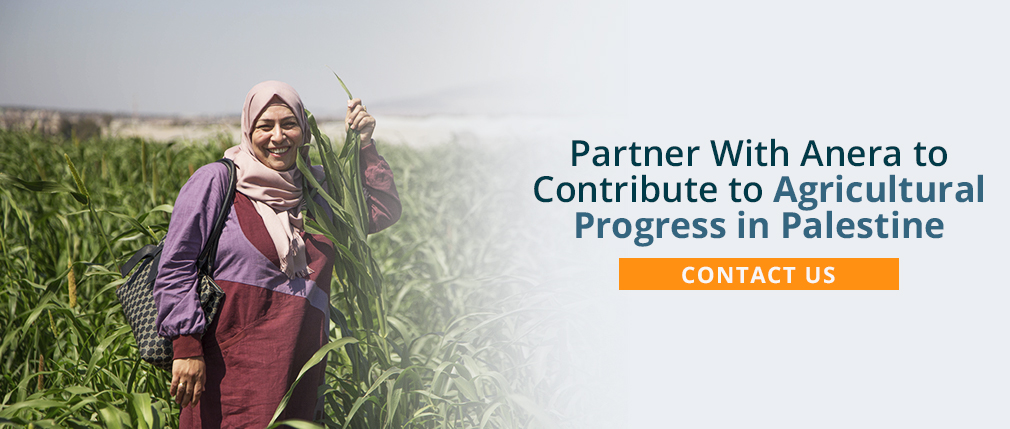

For 51 years, Anera has been a stabilizing, nurturing presence in the Middle East. Our longstanding connections in the region make us a trusted source and give us the unique ability to mobilize resources for long-term development projects. We see so much promise in the vibrant, resilient communities of Palestine and are committed to helping them work toward a more hopeful future.
You can help us make a difference in refugee lives across Gaza and the West Bank. Make a gift today, or sign up for a monthly donation.
OUR BLOG
Related
Part of a series on the impact of the war on all sectors of economic life within Gaza, Anera’s immediate response and plans for the future. Other posts cover housing, education, WASH, health and food production systems. Livelihood Recovery In Gaza, 57 years of occupation and…
InterAction and 50 Member CEOs, some of whom have organizations that work in Gaza, urge President Biden to take decisive and actionable steps to alleviate the humanitarian crisis in Gaza. Detailed within this letter are specific steps and commitments that…
